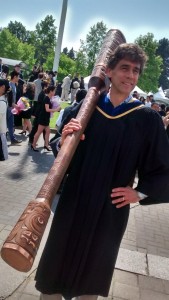*Apologies to the medievalists. Repeated below is our semi-annual appeal to UBC managers to Lay Down the Mace:
As we count down to May graduation, can we please remove the mace from convocation and governance at the University of British Columbia? The mace had its day in the first 100 years of this esteemed University but that day has gone.
Times have changed, business as usual has been called into question, the Board of Governors is still operating under the pall of a No Confidence vote cast by faculty members last year, and this year on 24 April an Open Letter signed by 110 faculty members was submitted to the UBC Chancellor Reappointment Committee.
The days of the mace in Convocation and governance are of the past and that part of the past is no longer worth reenacting.
Last year was an emotional year for UBC. As we launched the celebration of our Centennial at UBC 100, our President resigned under a cloak of secrecy. As we began to party, we launched an investigation to discover the lengths to which a Chair of the Board of Governors and administrators might go to suppress academic freedom. As no accountability was forthcoming, a No Confidence vote was cast. As the BoG continued with business as usual, staff and students expressed serious concerns to triangulate those of faculty members.
It’s difficult to know where this University now stands or what it stands for.
It is time to retire the mace, symbol of aggression, authority, and war. It’s time to march to graduation ceremonies in late May with open and empty hands as symbolic of peace and reconciliation of controversies and roles of the President’s Office.
UBC’s mace is a relic but a relic of what? The mace is symbolic speech but what is it saying about us now?
From ancient times, this club, this weapon of assault and offence, the mace was gradually adorned until the late twelfth century when it doubled as a symbol of civil office. Queen Elizabeth I granted her royal mace to Oxford in 1589. From military and civil power derives academic authority. The rest is history and it is not all good.
It is time to retire the macebearer, whose importance is inflated every year by the image’s presence on UBC’s graduation pages leading to Convocation. In pragmatic terms, if the mace falls into the hands of the wrong macebearer or manager at this point, someone’s liable to get clocked with it.
Is UBC’s mace still a respectable appendage to Convocation?
Remember, since that fateful November day in 1997, just five months into Martha Piper’s Presidency, when student activists put their bodies and minds on the line at the APEC protest, Tuum Est adorns both the can of mace sprayed in their eyes and the ceremonial mace that the President’s Office is eager to carry across campus every November and May.
Is it not time to retire the mace?


 Follow
Follow